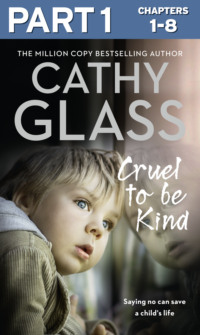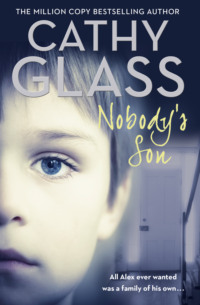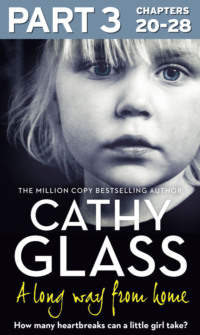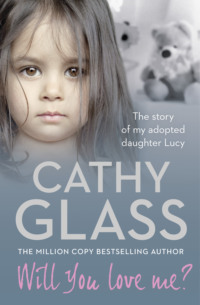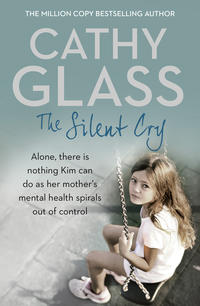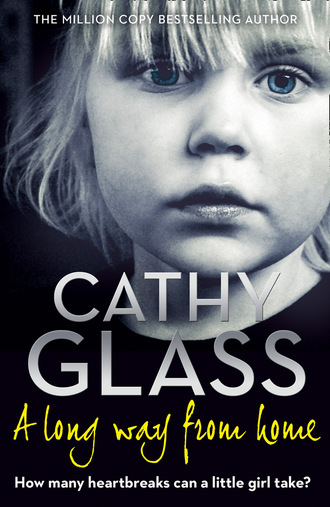
Полная версия
A Long Way from Home
‘You go,’ she said rudely, not looking at him. ‘I have to see to the child.’
Not wishing to upset her further, Ian returned to the playroom. At the end of the hour Ian asked the same care worker if Dr Ciobanu was in and she shook her head. ‘When will he be in his office?’ he asked.
She shrugged, but then said, ‘Children lose their things,’ suggesting she had understood and knew why they wanted to see him.
Ian didn’t pursue it with her, but the following day Anastasia was wearing the first dress they’d bought her, although the activity centre was nowhere to be seen. They asked the care worker – the other one – where her toys were but were met with the same dismissive shrug, which said she didn’t know or understand. Dr Ciobanu wasn’t in, and as Elaine played with Anastasia in the playroom Ian went to see if the missing toys were in Anastasia’s cot. They weren’t, and he noticed the mattress cover was grubby, as indeed were most of the covers in the other cots. The room smelled of urine and sweat, and as Ian glanced around at the children he felt guilty for worrying about a few missing toys when there was so much misery around him. On returning to Elaine he said, ‘The sooner we get Anastasia out of here the better.’
When they left that afternoon Ian asked the care worker when Dr Ciobanu would be in.
‘Not here,’ the care worker said.
‘I know. When will he be here?’
She shrugged.
‘I’ll phone him,’ Ian said to Elaine, frustrated. Apart from wanting to find Anastasia’s belongings, he wanted to know if they had a court date yet.
As it turned out, Ian didn’t have to phone Dr Ciobanu, for just as they got into their cab a car drew up behind them and Dr Ciobanu got out. ‘Please wait, we need to speak to him,’ Ian said to Danny.
Anastasia had returned inside by now with the care worker and Dr Ciobanu greeted them warmly and shook their hands.
‘Your time with Anastasia is going well?’ he asked them.
‘Yes, thank you,’ Ian said.
‘She waves you off at the gate?’
‘She comes to the gate, yes.’
‘Good. I tell the care workers to bring the children out to say goodbye. It’s nice for the parents.’
‘Thank you.’
‘And everything is going to plan so you have no need to worry,’ he reassured them in his usual upbeat manner.
‘Good,’ Ian said. ‘But I need to talk to you about something.’
‘Yes?’ And what Ian and Elaine learned next shocked and saddened them deeply.
Chapter Six
Lana’s Bear
‘Dr Ciobanu,’ Ian began, choosing his words carefully. ‘I’m sorry to trouble you, I know you’re very busy, but we bought Anastasia new clothes as you asked, and yesterday she was in old clothes that weren’t hers. Apart from one dress, the rest seem to have vanished. Also, we’ve been buying her toys but we can’t find them anywhere. They are not in the playroom or her cot. We’ve asked the care workers but they don’t seem to understand. Where do you keep her things?’
Immediately the doctor’s expression changed and he looked annoyed. Ian thought he was annoyed at them for bothering him. ‘I’ll speak to the care workers,’ he said bluntly.
‘We don’t want to cause any trouble. We’d just like to know where her belongings are.’
‘You need to take her toys to your hotel with you. You won’t get them back.’
‘Oh, why not?’ Elaine asked. ‘What about her clothes?’
‘I’ll try to find them,’ he said curtly, ‘but don’t hold your breath.’ With a nod signalling the conversation was over, he unlocked the gate.
Ian and Elaine looked at each other, confused, but not wishing to upset the doctor further, they returned to the cab.
‘Doctor not happy?’ Danny asked, having seen the exchange.
Ian let out a sigh, then explained that they couldn’t find Anastasia’s clothes and toys and the doctor seemed to have taken it personally.
‘He will,’ Danny said, turning in his seat to look at them. ‘He annoyed because it happens a lot. Parents bring nice new clothes and toys for their child, and sometimes charities donate play equipment, but it all goes.’
‘Where to?’ Elaine asked.
‘The workers in the orphanages take them home for their children and their families and friends’ children. Not just this orphanage but others too.’
‘But that’s stealing!’ Elaine exclaimed. ‘We bought those things for Anastasia.’
‘Yes, it is wrong of them, but you have to understand the people who work in the orphanages are very poor. They can’t afford to buy their children nice clothes and toys, and they don’t see why the orphans should have them. Also, many of the children are disabled so they think it’s a waste, as they can’t play with the toys. One charity gave a slide, sandpit and things for outside. The next day it was all gone. You need to look after Anastasia’s things, take them away with you, or you won’t see them again.’
‘How very sad,’ Ian said. ‘Thank you for explaining.’
The missing toys didn’t reappear and neither did the other two outfits. From then on Elaine and Ian did as suggested and took the toys away with them and then brought some back the next day. Anastasia didn’t protest at having her toys taken away from her as a child in a normal family would, as she’d had little experience of owning things. They couldn’t do the same with her clothes – keep dressing and undressing her – so they had to accept that the other two outfits they’d left had gone for good, and they kept the rest back for the court date and afterwards, when she would be with them in the hotel until they all flew home. Dr Ciobanu didn’t mention it again and neither did Ian and Elaine.
The doctor wasn’t at the orphanage much as he had to divide his time between a number of orphanages and other work in the community. As they neared the end of the second week, having not had a chance to see Dr Ciobanu again, Ian left a written message on the table in his office asking him if he could phone him, as they were concerned they hadn’t got a firm court date yet. Dr Ciobanu phoned their hotel room that evening but it wasn’t the news they’d been hoping for.
‘The judge is going on holiday,’ Dr Ciobanu said. ‘I am trying to fit you in before he goes but the court is very busy.’
Ian and Elaine knew delays happened, but it was still frustrating and it added to their anxiety that something could go wrong that would stop them from adopting Anastasia. Ian had taken a month off work – he was an engineer in a railway company – and a month should have been enough if everything went to plan.
‘If we can’t go to court before the judge goes on holiday, how long before he comes back?’ Ian asked Dr Ciobanu.
‘He’ll be away for three weeks.’ Ian’s heart sank. Elaine was watching him as he spoke and knew it was bad news.
‘Isn’t there another judge who could hear our case?’ Ian asked.
‘Lots of people take their holidays during August, judges included,’ Dr Ciobanu said. ‘But don’t worry, I’ll try my best to have your case fitted in before then. I’ll phone you with the date.’
‘Thank you,’ Ian said, and replaced the handset.
They weren’t greatly reassured. They’d seen enough of Dr Ciobanu to know he tended to reassure people by telling them what they wanted to hear.
‘If we don’t get to court before the judge goes away, I’ll have to phone work and ask for unpaid leave,’ Ian said to Elaine. Ian’s boss knew about the adoption and had been sympathetic when Ian had asked to take all his annual leave in one go, which needed special permission. Elaine, a legal secretary, had left her permanent job the day before they flew out. During their adoption assessment the social worker had said that one parent should be at home at least for the first year after the adoption to give the child continuity and time to settle in. Elaine hadn’t minded at all. She had waited a long time to be a mother and wanted what was best for her child and to make the most of every minute. Later, when Anastasia was old enough and went to school, Elaine could take some part-time work. Legal secretaries were always needed and with her experience she would find work easily.
Ian and Elaine felt they were bonding quickly with Anastasia, probably faster than she was with them. But that was to be expected. They had spent two years working towards this point, whereas Anastasia had had barely two weeks so far to adjust. Dr Ciobanu had told them that the care workers had explained to Anastasia what was happening, but Ian and Elaine doubted they’d had the time or patience to explain thoroughly or answer her questions and reassure her. He’d also told them that her attachment to her mother (or anyone else) was very weak, so she’d have no problem bonding with them once they were home, and wouldn’t miss anyone there.
Ian and Elaine had got to know some of the staff at the hotel, especially their waitress who served them each morning at breakfast. Her name was Maria and she told them she was improving her English so she could work in the UK where the wages were much higher. She practised her English on them as she served them and knew why they were there. She had a five-year-old daughter who was looked after by her mother during the twelve-hour shifts she worked six days a week. But it was only when Maria showed them a photograph of her daughter that she said her name was Lana. This in itself was not such a huge coincidence, as it was a very popular name, but its significance immediately struck Ian and Elaine. On a waitress’s wages, Maria would never be able to afford to buy her daughter nice toys, let alone a personalized bear, as they had done for Lana. They hadn’t had a chance to approach Dr Ciobanu about putting the bear on Lana’s grave and if they were honest the need for doing this was lessening, as they moved on and bonded with Anastasia.
‘I think I’d like Maria’s daughter to have Lana’s bear,’ Elaine said to Ian later. He readily agreed.
The following morning Elaine brought the bear in its original store gift bag down to breakfast and gave it to Maria. ‘For your daughter,’ Elaine said. We thought our child would be called Lana but we were wrong. We’d like you to have it.’ There was no need to go into any more detail about the child they’d lost.
Maria looked at them, surprised and delighted, then, as she took out the bear, her eyes filled and her face crumbled. ‘For Lana? It’s beautiful. I could never afford to buy her this. She will love it so much. Thank you.’ She took Elaine’s hand and then Ian’s and kissed them. ‘Thank you from the bottom of my heart.’
Elaine and Ian swallowed hard and knew they’d done the right thing.
They began extending their time with Anastasia and running over the hour. Dr Ciobanu wasn’t there to tell them not to and the care workers didn’t seem to mind. In fact, it probably did them a favour not having to watch Anastasia, who was one of the few non-disabled children and by far the most active. So the hour became one and a half hours and then two. Anastasia always appeared pleased to see them and eager to look inside the carrier bag of toys to discover what they’d brought for her today. She wasn’t a tactile child but that would come with time, and although she wasn’t saying any English words yet, she seemed to understand simple instructions – for example, put this piece of puzzle there.
One afternoon, while they were in the playroom, they heard English being spoken in the corridor outside without a heavy accent, which was unusual. Intrigued, Ian went out to investigate and saw two women in their early twenties. ‘Are you from the UK?’ he asked them.
‘Yes. Are you?’
‘Yes, pleased to meet you. I’m Ian.’
‘Pam and Mel,’ the girls said.
‘My wife is in the playroom. Come through and say hi. What part of the UK are you from?’
‘Bournemouth.’ And so they got chatting.
It’s always heartening to meet someone from your own country when you’re abroad, especially if the country you are in doesn’t speak the same language. Friendships can develop and confidences can be swapped, when they might not at home.
‘This is my wife, Elaine,’ Ian said, introducing her. ‘Pam and Mel. And this is Anastasia.’
‘Ahh, she’s cute,’ Pam said. ‘Is she your daughter?’
‘We hope she will be soon,’ Elaine said with a big smile. ‘We’re adopting her.’
‘That’s lovely,’ Pam said. ‘We met another couple adopting two boys, brothers. There seems to be a lot of adoption from this country.’
‘Yes, there is,’ Ian agreed.
‘Why are you here?’ Elaine asked, interested and making conversation.
‘We’re volunteers,’ Mel said. ‘We’re students and we’ve come here on a project to help in the orphanages. We came at the end of June and fly back on 12 September, ready for the new term.’
‘That’s very good of you,’ Elaine said. ‘Are you going to be working in this orphanage?’
‘We think so. We’ve been at another orphanage run by Dr Ciobanu about thirty kilometres from here, and he said we should come here as they needed the help more. He’s supposed to be meeting us here.’
‘They certainly could do with the help,’ Ian said. ‘They’re very short-staffed.’
‘We’ve only seen two care workers and there are thirty children,’ Elaine added.
‘That’s a very low ratio,’ Pam said. ‘The orphanage we’ve been working in had two care workers for twenty children and that was nowhere near enough. The building there was much newer than this, though. This is very old.’
‘I know,’ Elaine agreed. ‘And it has so little equipment. There’s nothing for the children to do. Are you staying locally?’
‘We might be sleeping here if they put us on the night shift. We’re not sure yet. It depends what Dr Ciobanu says. Otherwise we’ll get a room in town.’
The large front door of the orphanage could be heard opening and then clanging shut, the sound resonating down the empty and otherwise silent corridor.
‘I wonder if that’s him,’ Mel said, and stepped into the corridor to look. ‘Yes, it is,’ she said. ‘We’d better go.’
‘Hopefully see you again,’ Elaine called. ‘Good luck, and well done for volunteering.’
‘Thank you.’
‘I’m going to catch Dr Ciobanu while he’s here,’ Ian said to Elaine and disappeared out of the playroom.
‘Good afternoon, Mr Hudson, how are you?’ Dr Ciobanu turned from the students as Ian approached.
‘Well, thank you. Could I speak with you later?’
‘Yes, of course. I was going to phone you. I have the news you’ve been waiting for. Come to my office before you leave.’
‘Thank you,’ Ian said, and returned to the playroom, greatly relieved. ‘He says he has the news we’ve been waiting for,’ he told Elaine.
‘Fantastic.’ They both assumed it was good news: that they’d been given a court date for the following week and would fly home with Anastasia as planned.
As they played with Anastasia, Dr Ciobanu’s low voice could be heard outside showing the students around. It was reassuring to know there would be some extra help. They worried about Anastasia when they weren’t there.
They kept to the hour and then began packing away the toys, telling Anastasia that they had to see Dr Ciobanu. She didn’t say anything but recognized his name. She went with them to his office and as Ian knocked on the door she slipped her hand into Elaine’s. It was the first time she’d wanted to hold hands and Elaine was delighted. As she felt her small, cool fingers tuck themselves inside hers, Elaine knew it was a big step forward and a moment she would treasure for a very long time.
‘Come in,’ the doctor welcomed, opening the door. ‘She can come too,’ he said, referring to Anastasia.
Ian and Elaine sat in the two chairs in front of the table as Dr Ciobanu took his place behind it. Anastasia stood between Elaine and Ian, close but not quite touching. Elaine would have loved to pick her up and sit her on her lap, but she knew she had to wait until Anastasia was ready for that.
‘So you like your new mummy and daddy?’ Dr Ciobanu asked Anastasia in his usual upbeat manner. It was unlikely she understood, but seeing the man in charge smiling and talking to her, she nodded. ‘Good. And they obviously like you very much, so all is well.’
‘Very much!’ Ian and Elaine agreed.
He looked at them in the same positive manner. ‘We have news of the court date at last. There is no free time before the judge goes on holiday, so the child’s mother has returned to work abroad until the court hearing. She needs the money and Anastasia will stay here with us for that period.’ He paused.
‘I see,’ Ian said, trying to understand what this meant. ‘For how long?’
‘Three months. As you know, unless the child is an orphan the mother has to be in court for the adoption hearing to give her consent, so I have booked the court date for the day after she returns – 23 November.’ He looked at them as though they should be pleased.
It was a moment before either of them could speak. ‘But I can’t take another three months off work,’ Ian said.
‘No, of course not. You must fly home and return for the court hearing.’
‘Oh. It can’t be heard in another court with a different judge?’ Ian asked.
He shook his head. ‘Many staff are on holiday, there is no free time. And the child’s mother has already left the country. It is nothing for you to worry about. Trust me. Anastasia will be looked after here.’
Chapter Seven
Time Apart
Ian and Elaine couldn’t agree that the news Dr Ciobanu had given them was ‘nothing to worry about’. In fact, they spent the rest of the day and most of the night worrying. They’d bonded with Anastasia and they were sure she was bonding with them. Three months was a long time in a young child’s life, and wouldn’t being apart for all that time undo most of their bonding, so they’d have to start all over again? Dr Ciobanu had been philosophical when he’d told them and said delays happened, it couldn’t be helped, and he would explain to Anastasia that her new mummy and daddy were going home to get her room ready. He also said to keep their memory alive he’d show her the photographs he had of them on file that had accompanied their original application. He offered them the consolation that three months would pass quickly and that they needn’t fly back until the day before the adoption hearing, as all the paperwork was now in court.
During the long hours of the night as they lay awake they tried to think of practical alternatives. Elaine said that possibly she could stay so at least Anastasia could see her each day, but they certainly couldn’t afford for her to stay in the hotel.
‘Perhaps I could find a cheap room in a lodging house like those students?’ Elaine suggested doubtfully. For even as she said it her stomach churned. She wasn’t an adventurous person, and, a little on the shy side, she relied heavily on Ian. The thought of spending three months separated from him in a foreign country among people she didn’t know and where she didn’t speak the language filled her with dread.
‘Not unless I fly out each weekend,’ Ian replied to her. ‘But the cost of that would be prohibitive.’
Still awake at 2 a.m. they reached their lowest point. ‘I’m beginning to regret ever starting international adoption,’ Elaine said, close to tears. ‘It’s been one heartache after another. First Lana and now this.’
‘Don’t say that,’ Ian chided, drawing her close. ‘We’ve come this far. Let’s try to focus on the positives. The court date is definitely set. All our paperwork is in and Anastasia’s mother hasn’t changed her mind.’ Which they knew from other couples did happen – the parent(s) changed their minds or a relative came forward to look after the child at the last moment. ‘And think about all those families we’ve been talking to online who have successfully adopted despite all the setbacks,’ Ian added.
‘Yes.’ Elaine conceded he had a point. ‘I wonder if anyone has experienced what we’re going through,’ she said.
‘I’m sure they have,’ Ian said. ‘But once the adoption is granted you probably forget all the bad things.’
Finally, in the early hours, they fell into an exhausted sleep, but Ian was awake early. Leaving Elaine asleep, he quietly slipped into his clothes and went down into reception, which had the best phone signal, and from there he messaged Maggie, the founder of their online group for international adoption. She and her husband had adopted four children from two different countries and were happy to share their knowledge and encourage those going through the process for the first time. Ian messaged her that their court date had been postponed for three months and they had been told to return home, and they weren’t sure what to do for the best. He then waited in reception to see if she would reply straight away, and five minutes later his phone bleeped with a message.
Sorry to hear about the delay, Ian. A disappointment but I’ve heard of other cases. You can’t do anything so fly home as Dr C said. We can chat when you get back. I am sure the adoption will go through. Don’t lose heart. You’ll have the rest of your lives with your child. M x
Which was exactly the message of hope Ian needed. He returned to their hotel room, and when Elaine woke he showed her the message and she, too, took comfort from it.
Nevertheless, it was with heavy hearts that they confirmed their flight home and then made the most of their last few days with Anastasia, but spending time with her now was bittersweet. While they wanted to make the most of every minute, they were acutely aware they wouldn’t be seeing her for three long months and would miss her dreadfully. They tried to talk to her about what was going to happen and told her they loved her, but it was doubtful she understood. It was impossible to know what she was thinking or feeling, and if Dr Ciobanu had said anything to her to explain, it wasn’t obvious from her behaviour.
On their penultimate day they bumped into Mel and Pam, who were working the night shift, and Elaine told them they were having to return home as their court date had been postponed for three months. The girls were very sympathetic and said they would keep an eye on Anastasia while they were here. But of course they were due to return home a week later and after that Ian and Elaine assumed the children would be left in the care of the two workers again. It was very worrying. They felt protective of Anastasia and wanted to keep her safe.
On the last day they took all the toys and clothes they’d brought for her that hadn’t gone missing into the orphanage and left them in carrier bags marked with her name in Dr Ciobanu’s office. Hopefully, at least some of them would be used by her. Then they had to say goodbye and it was heartbreaking. Anastasia walked between them down the path holding a hand each and the care worker unlocked the gate. As they bent to Anastasia’s height they tried to hide their emotion, but their pain must have been obvious.
‘Goodbye for now, love, don’t forget us,’ Elaine said, her eyes immediately filling. ‘We won’t forget you. We’ll put your photograph in our living room so you are with us all the time. We love you so much.’ She kissed Anastasia’s cheek and straightened. She couldn’t take much more.
Ian kissed Anastasia but couldn’t say anything.
They left her at the gate with the care worker and climbed into the cab. Danny knew this was their last visit for three months and didn’t immediately pull away. They both looked out of the side window. Usually, as soon as the care worker had locked the gate they returned inside, but now Anastasia clung to the wire netting, pressing her face against it and looking at them. It was one of the few occasions she made eye contact and it was pitiful. Elaine and Ian saw the pain and rejection in her eyes. She might not have been able to tell them in words what she was feeling, but her eyes said it all. Her mother had left her and now they were leaving too.




